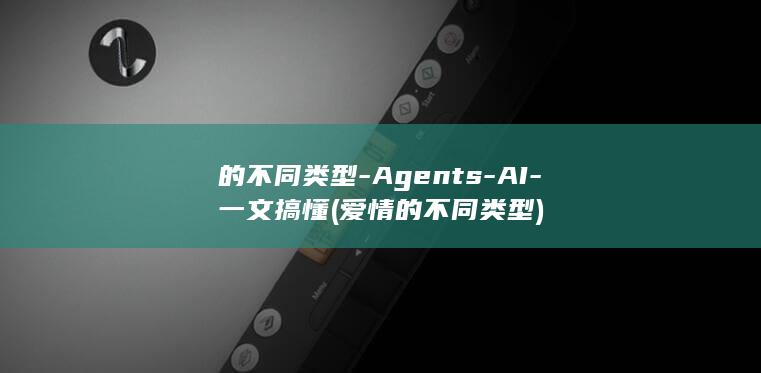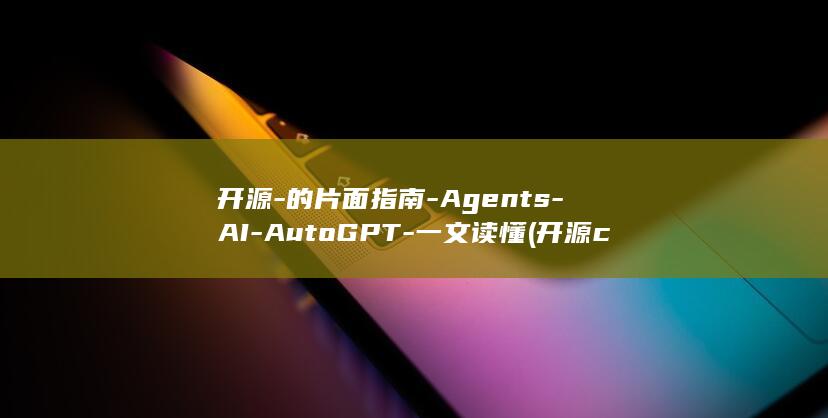AI-Agents-技术-全面解析 (爱啊歌词)
Imagine software entities that can autonomously interact with the environment, make decisions based on collected data, and execute actions specific to scenarios with minimal human intervention. Thanks to the power of AI Agents, this reality is closer than you might think. These intelligent agents are revolutionizing industries and transforming the way we live. But what exactly are AI Agents, and how do they work? In this blog post, we'll dive deep into the world of AI Agents!
What are AI Agents?
Artificial Intelligence (AI) has transformed the way humans interact with machines by providing them with the ability to reason and perform tasks that aid humans in specific business contexts and achieve certain goals. At the core of AI systems, we find these intelligent entities called AI Agents, which can perceive and analyze environmental changes and take appropriate actions to fulfill predefined objectives.
Typically, different types of AI Agents are designed to address specific challenges and accomplish particular tasks. Delving deeper into the types of AI Agents is crucial for building effective and efficient AI systems. By understanding the capabilities and domains of various AI Agent types, we can better select the most suitable agents for our specific needs.
Types of AI Agents
AI Agents can be specialized for a particular task, such as image recognition, speech recognition, or natural language processing. These agents leverage advanced algorithms and models to analyze input data and generate accurate outputs. On the other hand, we have general-purpose agents, which possess broader intelligence and adaptability. These agents can tackle multiple tasks and domains, exhibiting the ability to learn and adapt. General-purpose agents are often built on machine learning and deep learning techniques, improving their performance and capabilities through learning and inferencing from vast amounts of data.
Additionally, AI Agents can also be categorized based on their interaction style. Some agents are autonomous, meaning they can independently perceive the environment, make decisions, and execute actions. Other agents are collaborative, interacting with human users to understand their intentions and goals in order to provide assistance and recommendations.
What are Autonomous AIAgents?
AI Agents have been around since the 1980s, when computer scientists began exploring how to develop intelligent software that could interact like humans. The concept has since evolved to encompass intelligent agents that can independently make decisions and complete tasks in specified contexts. An AI Agent is a software program designed to interact with its environment, perceive sensory data, and act upon that data to achieve specific goals. AI Agents can simulate intelligent behavior, ranging from simple rule-based systems to complex, machine-learned models. AI Agents employ predefined rules or trained models to make decisions and may require external control or supervision.
In contrast, autonomous AI Agents are advanced software programs capable of operating independently without human control. They can autonomously think, act, and learn, without the need for constant human input. These agents find applications in various domains such as healthcare, finance, and banking, where they help processes function more smoothly and efficiently. They can adapt to new situations, learn from experiences, and leverage their internal systems to make decisions.
The Rise of AI Agents
As AI technology advances, the capabilities andapplications of AI Agents are constantly expanding. In some ways, AI Agents have become essential tools in multiple domains, helping humans solve complex problems and increase productivity. Through continuous improvement and refinement of the design and algorithms of AI agents, we can expect more intelligent and autonomous agents to emerge, driving further innovation and assistance across various sectors.
In recent months, AI Agents have gained immense popularity and attention. One notable example is AutoGPT, which has garnered over 140,000 stars on GitHub. This reflects the widespread interest and support for open-source AI Agent projects. Additionally, new companies focusing on AI Agent development and applications are emerging almost every week. This indicates a rapidly growing AI Agent landscape, attracting an increasing number of entrepreneurs and investors.
The ecosystem of AI Agents is diverse, ranging from agents that review code (e.g., SweepAI) to virtual personal assistants like Lindy, covering a wide range of functionalities and domains. The availability of these agents provides us with more choice and possibilities to satisfy our specific requirements.

Conclusion
AI Agents are transforming the way we interact with machines and the world around us. These intelligent software programs can perceive, reason, and act autonomously, offering a wide range of potential applications. As technology continues to advance, we can expect AI Agents to play an even greater role in our lives, helping us to solve complex problems, automate tasks, and enhance our overall productivity. The future of AI Agents is bright, and the possibilities are endless.
人工智能的概念及其技术包括哪些方面?
人工智能(Artificial Intelligence,AI)是一门研究如何使计算机能够执行通常需要人类智力才能完成的任务的科学。人工智能涉及多个方面的技术和概念,包括但不限于以下几个方面:
1. **机器学习(Machine Learning)**:机器学习是人工智能的一个子领域,它致力于开发算法和技术,使计算机能够从数据中学习并做出预测或决策,而无需明确编程。机器学习包括监督学习、无监督学习、强化学习等多种方法。
2. **深度学习(Deep Learning)**:深度学习是机器学习的一个分支,它使用人工神经网络来模拟人类大脑的工作方式,从而实现对复杂数据的高级抽象和学习。深度学习在图像识别、语音识别等领域取得了显著的成就。
3. **自然语言处理(Natural Language Processing,NLP)**:自然语言处理是一门研究如何使计算机能够理解、解释和处理人类语言的技术领域,包括文本分析、语音识别、机器翻译等。
4. **专家系统(Expert Systems)**:专家系统是一种基于知识库和推理机制,模拟人类专家决策过程的人工智能系统。它可以用于诊断、咨询、规划等领域。
5. **计算机视觉(Computer Vision)**:计算机视觉是研究如何使计算机能够看和理解图像或视频的技术领域,包括图像识别、目标检测、图像生成等方面。
6. **智能代理(Intelligent Agents)**:智能代理是一种能够感知环境并采取行动以实现特定目标的自主实体,它是人工智能在实际应用中的重要组成部分。
除了上述技术领域之外,人工智能还涉及到伦理、法律、社会等多个方面的问题,如人工智能的道德问题、隐私保护、智能系统的透明度与可解释性等。这些都是人工智能发展中需要认真考虑的议题。
人工智能技术的理解
人工智能技术的理解如下:
ai技术是人工智能技术,它属于计算机科学衍生出来的一种,通过人工和智能结合的方式,让计算机具备能够像人体大脑一样对特定事物和目标做出分析、反应、动作、反馈的技术。它也是未来世界主要发展的技术,各个国家都在大力发展ai技术,而人们认为它是第四次产业革命的关键点。
ai技术是新兴科学技术,AI技术的研究领域包括机器人、语言识别、图像识别、自然语言处理和专家系统等。AI的目的就是希望让计算机能像人类一样进行学习和思考。
ai技术的应用:
ai技术将给数字经济的创新发展提供强大动力。在内容生产层面,生成性AI、数字虚拟人等AI技术和机器学习模型将带来内容生产的变革,可以自主生成文本、图像、音频、视频、虚拟场景等各类数字内容,这将推动生成性AI的蓬勃发展,打造新的数字内容生成与交互形态。
此外AI和生成性AI带来的内容生产变革也将让VR/AR、元宇宙等未来互联网应用成为可期待的现实。
免责声明:本文转载或采集自网络,版权归原作者所有。本网站刊发此文旨在传递更多信息,并不代表本网赞同其观点和对其真实性负责。如涉及版权、内容等问题,请联系本网,我们将在第一时间删除。同时,本网站不对所刊发内容的准确性、真实性、完整性、及时性、原创性等进行保证,请读者仅作参考,并请自行核实相关内容。对于因使用或依赖本文内容所产生的任何直接或间接损失,本网站不承担任何责任。






